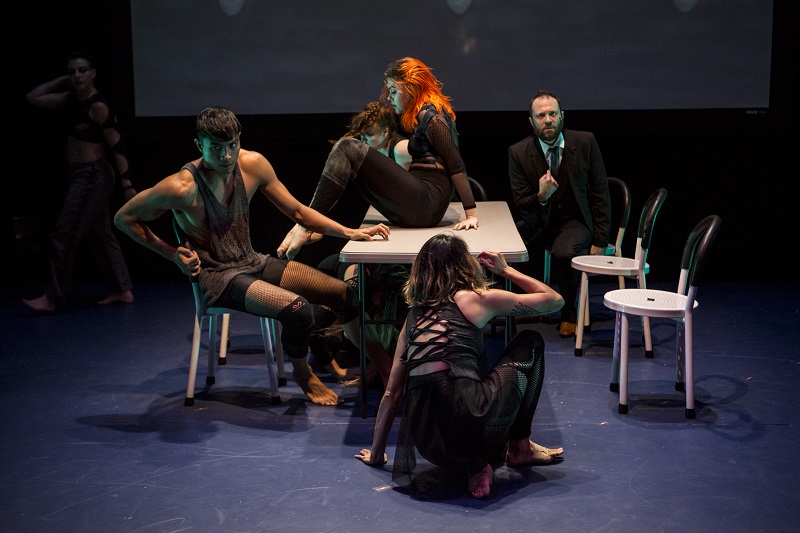
Mixed in with the calm piano music that plays prior to the start of The Loon, a new play that advertises itself as based in part on a 1980 Audubon Society record,* are periodic voice-over GPS directions guiding the listener out of New York City and northwards. This seems like an appropriate prelude, because The Loon packs quite a journey into its running time, from the midnight lakes of Maine, to the outer reaches of the solar system, to the inner workings of the human heart. Directed by Dan Safer, who co-created and co-choreographed the piece with the other members of Witness Relocation (Alexa Andreas, Kelly Bartnik, Sunny Hitt, Annie Hoeg, Eva Jaunzemis, Robert M. Johanson, Vanessa Koppel, and Trevor Salter), the play features Robert M. Johanson as the audience's guide on this journey, a well-dressed host for the evening who is, with a few exceptions, the sole speaking performer. Contrasting with his suit and earpiece, dancers in deconstructed, punk-inspired costumes perform behind, with, and around him.
The set dressing is minimal: a screen onto which associative images are projected and some chairs, a table, and a sofa that come and go. This is appropriate to a work whose main connective tissue strips back and considers layers of reality. Loons cannot walk on land because of how their physiology has evolved to make them incredibly effective divers, and the play similarly specializes in deep dives, snatching at the big existential questions beneath the surface. Johanson, as the narrator, wastes little time in asking the audience, "What is time?" He points out its illusory qualities and its relativism, such as the way that two bodies moving at different velocities will experience the passage of time at different speeds relative to one another. Time, he suggests, can be seen not as an objective reality but as another way that we represent ourselves. Spaces too fall into this category, also functioning as part of how we define and represent our selves, whether that is the space of an apartment that we pass through every day; a sort of sitcom version of a suburban living room with Fight Club-esque Ikea catalog imagery as a backdrop, where the masked heads of a wife and daughter call attention to the implications of artificiality and illusion; a solar system whose borders we cannot yet agree on; or a theater in which we have all decided to see a play about loons.
Another point that the play makes is that these spaces, and everything in them, naturally tend towards entropy and chaos. Order is imposed only with effort and energy. At one point, a discussion of the stages of love, including its ending, underscores this law. At another point, we watch the idea play out, as two dancers enact nights on the couch in front of the tv, eating popcorn to Johanson's nature-documentary-style narration. As this enactment repeats itself, however, it transforms into a liberatory chaos of its own. Entropy applies here conceptually as well, with fourth-wall breaking meta moments increasing as the play goes on. Johanson continues to recite the Wikipedia entry on loons, which may be cribbed word for word from another source, maybe even the Audubon Society record. The dancers participate in this deconstruction, but it is most focused on Johanson, who embodies the layers of reality that The Loon deconstructs: he is character (with his own personal layers), actor, and writer all at once and increasingly explicitly. He questions the reality of the conversation with the audience and of the self having that conversation. Is a performer more real offstage than on? Or just a different kind of real? Is the answer, like time, relative? When Johanson, or his character (as with the edge of the solar system, where do we draw the boundary line?), relinquishes control over his dialog in one section, isn't that unscriptedness also scripted?
The Loon is one of those plays for which describing it doesn't do justice to the experience of seeing it. It is full of unexpected moments and wry humor; the cast is excellent, Johanson gives a magnificent performance, and all of it is great fun to watch. The final big question that The Loon pulls out of its lake is, given everything discussed to that point, "Why feel lonely?" Why, indeed, especially when, at least for a little over an hour, you can have a great time joining other insignificant specks in the universe instead? - Leah Richards & John Ziegler
